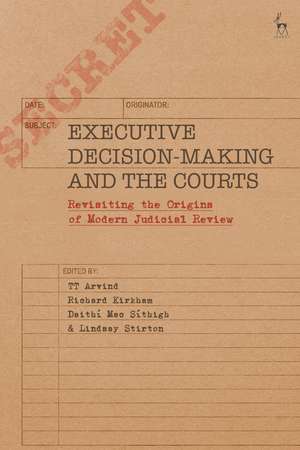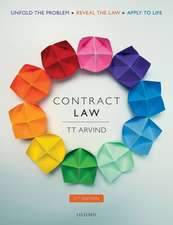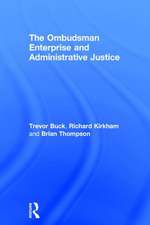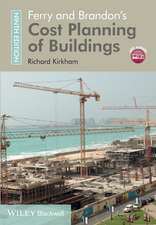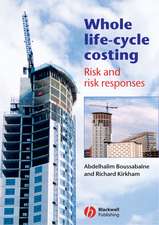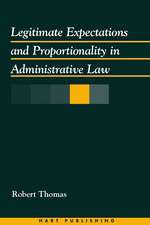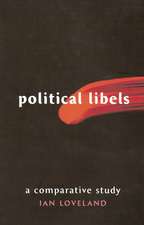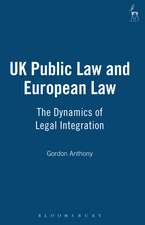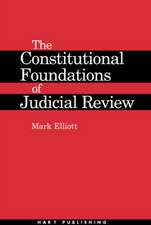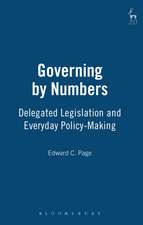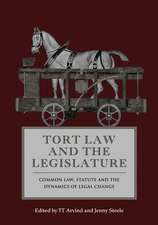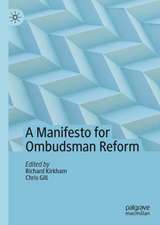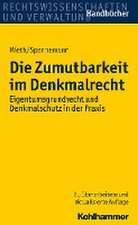Executive Decision-Making and the Courts: Revisiting the Origins of Modern Judicial Review
Editat de TT Arvind, Richard Kirkham, Daithí Mac Síthigh, Lindsay Stirtonen Limba Engleză Hardback – 24 feb 2021
| Toate formatele și edițiile | Preț | Express |
|---|---|---|
| Paperback (1) | 318.86 lei 6-8 săpt. | |
| Bloomsbury Publishing – 19 oct 2022 | 318.86 lei 6-8 săpt. | |
| Hardback (1) | 575.57 lei 6-8 săpt. | |
| Bloomsbury Publishing – 24 feb 2021 | 575.57 lei 6-8 săpt. |
Preț: 575.57 lei
Preț vechi: 819.92 lei
-30% Nou
Puncte Express: 863
Preț estimativ în valută:
110.15€ • 114.57$ • 90.93£
110.15€ • 114.57$ • 90.93£
Carte tipărită la comandă
Livrare economică 14-28 aprilie
Preluare comenzi: 021 569.72.76
Specificații
ISBN-13: 9781509930333
ISBN-10: 1509930337
Pagini: 504
Dimensiuni: 156 x 234 x 35 mm
Greutate: 0.88 kg
Editura: Bloomsbury Publishing
Colecția Hart Publishing
Locul publicării:London, United Kingdom
ISBN-10: 1509930337
Pagini: 504
Dimensiuni: 156 x 234 x 35 mm
Greutate: 0.88 kg
Editura: Bloomsbury Publishing
Colecția Hart Publishing
Locul publicării:London, United Kingdom
Caracteristici
Important retrospective on four seminal judgments in administrative law decided half a century ago
Notă biografică
TT Arvind is Professor of Law at the University of York, UK.Richard Kirkham is Senior Lecturer in Law at the University of Sheffield, UK.Daithí Mac Síthigh is Professor of Law and Innovation at Queen's University Belfast, UK.Lindsay Stirton is Professor of Public Law at the University of Sussex, UK.
Cuprins
PART ISETTING THE SCENE1. Introduction: Judicial Review and the Quartet TT Arvind, University of York, UK, Richard Kirkham, University of Sheffield, UK, Daithí Mac Síthigh, Queen's University Belfast, UK and Lindsay Stirton, University of Sussex, UK2. Lord Reid: The Judge as Law Maker? Robert Reed, Lord Reed of Allermuir, President of the Supreme Court of the United Kingdom PART IITHE QUARTET IN CONTEXT3. Ridge v Baldwin: Executive and Judicial Approaches to Administrative Law Before and During the Quartet Years Robert Thomas, University of Manchester, UK4. Judges and Parliamentary Democracy: The Lessons of Padfield v Ministry of Agriculture, Fisheries and Food Maurice Sunkin, University of Essex, UK5. Legitimacy and the Courts: The Forgotten Story of Conway v Rimmer TT Arvind, University of York, UK and Lindsay Stirton, University of Sussex, UK6. Anisminic in Retrospect David Feldman, University of Cambridge, UK PART IIITHE LEGACY OF THE QUARTET7. Plus ça Change? An Empirical Analysis of Judicial Review in Modern Administrative Law Sarah Nason, Prifysgol Bangor University, UK8. The Reawakening of Common Law Rights: Are they Still 'Suitable for the Winning of Freedom in the New Age'? Paul Bowen KC, Brick Court Chambers, UK9. Beyond the End of Ouster Clause History? Joe Tomlinson, University of York, UK PART IVTHE QUARTET OUTSIDE ENGLAND10. Administrative Law and the Administrative Court for - or in - Wales David C Gardner, No5 Barristers' Chambers, Bristol, UK11. The Rule of Law against Judicial Review? The Quartet in Scots Administrative Law Paul F Scott, University of Glasgow, UK12. The Quartet Plus Two: Judicial Review in Northern Ireland Gordon Anthony, Queen's University Belfast, UK PART VCOMPARATIVE PERSPECTIVES ON THE QUARTET13. Israeli Administrative Law and the Quartet - One Step Ahead Daphne Barak-Erez, Tel Aviv University, Israel14. Importation and Indigeneity: The Quartet in New Zealand Administrative Law Dean R Knight, Victoria University of Wellington, New Zealand15. The Quartet in the New Commonwealth Peter Cane, University of Cambridge, UK PART VITHE QUARTET IN THEORY, PRACTICE AND HISTORY16. The Quartet Cases Compared Stephen Bailey, University of Nottingham, UK17. 'Judicial Power' and Political Power: Reflections in Light of the Quartet Alexander Latham-Gambi, Swansea University, UK18. Strategic Judging: Lessons from the Reid Era of Judicial Decision-Making Richard Kirkham, University of Sheffield, UK and Dimitrios Tsarapatsanis, University of York, UK PART VIICONCLUSION19. The Real Argument about Judicial Review TT Arvind, University of York, UK, Richard Kirkham, University of Sheffield, UK, Daithí Mac Síthigh, Queen's University Belfast, UK and Lindsay Stirton, University of Sussex, UK
Recenzii
The essays make fascinating reading for anyone concerned with the constitutional relations between the legislature, executive and judiciary, and the vexed question as to whether judges are too deferential to the assessments of the executive or improperly arrogating decision-making to themselves contrary to the wishes of Parliament.
